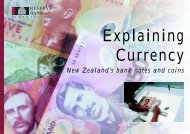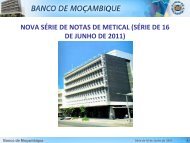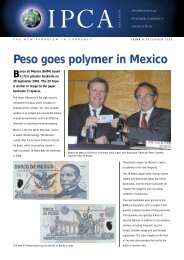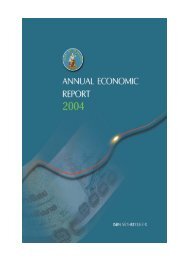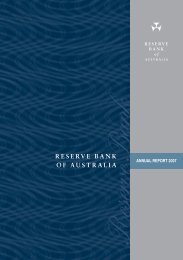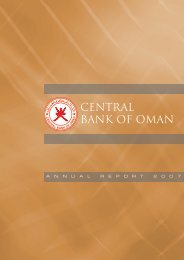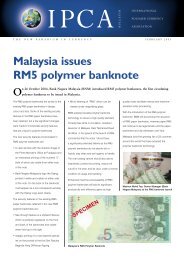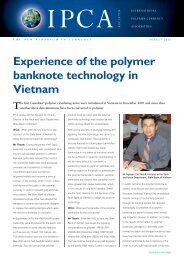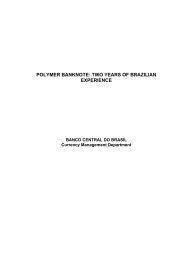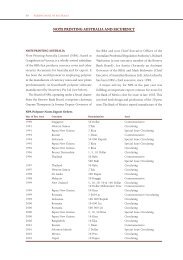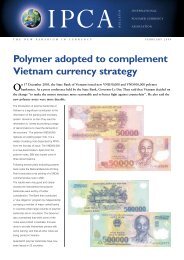ANNUAL REPORT 2008 - Polymer Bank Notes of the World
ANNUAL REPORT 2008 - Polymer Bank Notes of the World
ANNUAL REPORT 2008 - Polymer Bank Notes of the World
You also want an ePaper? Increase the reach of your titles
YUMPU automatically turns print PDFs into web optimized ePapers that Google loves.
Chart 33 Current account balance and itscomponents(annual data; EUR billions)100806040200-20-40-60-80-100200520062007<strong>2008</strong>CurrentaccountGoods Services Income CurrenttransfersSource: ECB.Note: Data for <strong>2008</strong> refer to <strong>the</strong> year to October.100806040200-20-40-60-80-10029 December <strong>the</strong> euro traded at GBP 0.98,<strong>the</strong> highest level since <strong>the</strong> launch <strong>of</strong> <strong>the</strong> singlecurrency in 1999. The noticeable weakening<strong>of</strong> <strong>the</strong> pound, particularly in <strong>the</strong> last months<strong>of</strong> <strong>2008</strong>, relates to <strong>the</strong> significant slowdown ineconomic activity in <strong>the</strong> United Kingdom, whichtriggered a sizeable easing <strong>of</strong> monetary policyconditions and an associated fall in longer-termyields.The euro appreciated significantly against<strong>the</strong> currencies <strong>of</strong> several EU trading partnereconomies between early January and31 December, for example by 15.3% against<strong>the</strong> Swedish krona, 15.3% against <strong>the</strong> Polishzloty, 12.3% against <strong>the</strong> Romanian leu, 5.3%against <strong>the</strong> Hungarian forint and 1.9% against<strong>the</strong> Czech koruna. A sizeable streng<strong>the</strong>ningwas also witnessed vis-à-vis <strong>the</strong> Korean won(33.6%), <strong>the</strong> Norwegian krone (22.1%) and<strong>the</strong> Australian and Canadian dollars (21.0%and 17.1% respectively). The appreciation<strong>of</strong> <strong>the</strong> euro against <strong>the</strong>se currencies wascounterbalanced partly by its weakeningagainst <strong>the</strong> currencies <strong>of</strong> several Asianpartners whose currencies are linked to <strong>the</strong> USdollar, namely <strong>the</strong> Chinese renminbi (11.4%)and <strong>the</strong> Singapore and Hong Kong dollarsChart 34 Euro area export volumes toselected trading partners(indices: Q1 2004 = 100; seasonally adjusted; three-monthmoving average)18016014012010080extra-euro areaUnited StatesUnited KingdomOPECAsiaCEECs2004 2005 2006 2007 <strong>2008</strong>180160140120100Source: ECB.<strong>Notes</strong>: Last observation refers to December <strong>2008</strong> except forextra-euro area and <strong>the</strong> United Kingdom (November). “CEECs”stands for central and eastern European countries.(5.2% and 6% respectively). The euro also lostground against <strong>the</strong> Swiss franc (10.2%) amidpositioning in and out <strong>of</strong> carry trades, giventhat <strong>the</strong> Swiss franc, like <strong>the</strong> Japanese yen,played <strong>the</strong> role <strong>of</strong> funding currency in this form<strong>of</strong> financial transaction.The real EER, based on different cost and pricemeasures, appreciated in <strong>the</strong> first four months<strong>of</strong> <strong>2008</strong> and <strong>the</strong>n stabilised until August.After declining until November it reboundedsomewhat in <strong>the</strong> last month <strong>of</strong> <strong>2008</strong>. In <strong>the</strong> lastquarter <strong>of</strong> <strong>2008</strong> <strong>the</strong> real EER <strong>of</strong> <strong>the</strong> euro, basedon consumer prices, was 2% below its averagevalue in 2007 and 4% below its average level in<strong>the</strong> corresponding quarter <strong>of</strong> 2007.CURRENT ACCOUNT SHIFTED INTO DEFICIT IN <strong>2008</strong>In <strong>2008</strong> <strong>the</strong> current account <strong>of</strong> <strong>the</strong> euro arearecorded a deficit <strong>of</strong> €63.2 billion (or 0.7% <strong>of</strong>euro area GDP), compared with a surplus <strong>of</strong>€36.3 billion in 2007. This resulted largelyfrom <strong>the</strong> goods balance shifting into deficit.In <strong>2008</strong> <strong>the</strong> goods balance recorded a deficit<strong>of</strong> €0.6 billion, compared with a surplus <strong>of</strong>€56.6 billion in 2007. The weakening <strong>of</strong>exports, particularly in <strong>the</strong> second half <strong>of</strong> <strong>the</strong>year, toge<strong>the</strong>r with a robust increase in import8080 ECBAnnual Report<strong>2008</strong>



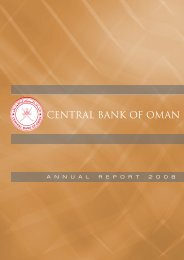
![KNOW YOUR NEW GIBRALTAR BANKNOTES - [Home] bThe/b](https://img.yumpu.com/50890985/1/184x260/know-your-new-gibraltar-banknotes-home-bthe-b.jpg?quality=85)
![PAPUA NEW GUINEA - [Home] - Polymer Bank Notes of the World](https://img.yumpu.com/49758743/1/190x143/papua-new-guinea-home-polymer-bank-notes-of-the-world.jpg?quality=85)
